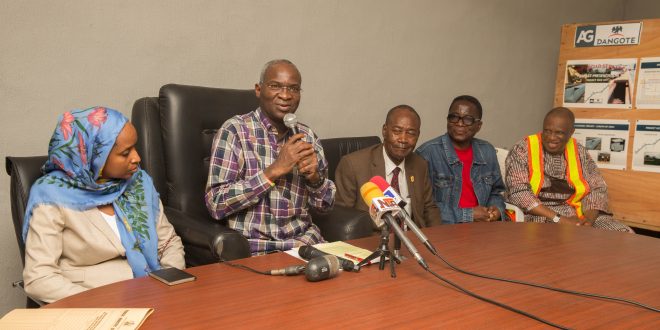I welcome you to another of our monthly meetings at which I feel the need to make fairly extended opening remarks, in order to properly place on record the steps we are taking, the progress we are making and the challenges we still have to overcome, as we pursue our road map of incremental, steady and ultimately uninterrupted power.
I am compelled to start on a sad note, to acknowledge an electrical accident that occurred in Minna, Niger recently, and to commiserate with the victims and extend our heartfelt sympathy to their families and to the people and Government of Niger state.
As soon as the incident was brought to my attention, I asked the officials of NEMSA, our safety and standards agency to visit the scene, condole the victims and conduct an investigation, the report of which reached me by e-mail over the weekend and which we will review and implement.
As you will re-call, Government has approved the Power Sector Recovery Programme, a series of actions, Policies and Programmes aimed at re- engineering the shortcomings of the privatisation process, supporting the process through this transition and learning period, and ultimately delivering a stable, competitive and efficient Power Sector for Nigeria.
Some of the policies, programmes, actions which have started taking effect include:
- Payment assurance guarantee of N 701b
- Constitution of some boards of agencies like NERC and REA, with more still to come
- Verification of MDA debts, now completed with plans to get approvals on how to pay
- Expansion of transmission capacity with the completion of Kukwaba Sub-Station last month to bring relief to Katampe in Abuja, Completion of Aja Sub-Station in Lagos and last week to completion of the repairs at Ikot Ekpene switching station to activate the full 1,300MW evacuation capacity of the Calabar to Ikot Ekpene double circuit transmission line.
- FEC approval of the compromise agreement that frees the Federal Government of Nigeria of Judgement Debt of N119Billion, and also releases N 39 Billion towards the supply of meters to customers of Discos
I will pause here to expatiate on how this will work
Please re-call that Government had in the past attempted to intervene in meter supply through CAPMI which ultimately I decided we should wind down because of the distrust and disaffection it was creating between consumers and Discos with Government caught in the middle with numerous petitions by customers who paid for meters that were not delivered within the approved time or at all.
Some Discos have come back to say that their customers still want to pay for meters and they can reach agreements with them on how to pay for it.
Government will not stand in the way of such an agreement. It is consistent with the intent of privatization envisioned by The Electric Power Sector Reform ACT (EPSRA) or at least it does not violate the Act.
What I will reiterate is that the Discos have the obligation to meter customers, because they are the ones who charge for electricity which must be measured.
If the customers and the Discos reach an agreement between themselves, where the customer assumes the responsibility of the Disco of his own free will, and NERC sanctions this agreement, then so be it.
The difference between this kind of agreement and CAPMI, is that it is not a government initiative which CAPMI was. However, through NERC, Government will monitor and regulate to ensure that Discos do not use this as an excuse to abdicate their responsibility to provide meters.
In addition to this kind of agreement, what government has decided to do is optimize the EPSRA provision to democratize access to meters, starting with the N 39 Billion, which will be a loan to the meter provider.
While it is true that Discos have the obligation to meter customers, the law did not vest a monopoly of meter supplies, or even retail sales, in Discos. Anybody who qualifies under safety regulation by NEMSA and under licenses issued by the NERC can supply meters to customers under conditions stipulated by NERC.
In other words, meter supply is an open but regulated business. You need a license from NERC to undertake it. You need to comply with testing and safety standards of NEMSA to produce, import or install it but it is not a monopoly for Discos alone.
Therefore, pursuant to the provisions of the EPSRA, NERC will issue regulations for :
- Meter service providers
- Meter and retail franchise operators
- Community Aggregation Services for sale of electricity and provision of meters
- Low cost meter supply
Once the regulations are ready we will work with NERC to clarify and announce how to licence and implement the metering programmes.
We have met with investors of Discos and discussed these intentions with them, and we will work with them through NERC to formalize the details.
The successful implementation of this programme will help to reduce conflict between Discos and customers, ensure collection of tariff, reduce losses, improve liquidity and bring some relief to the finances of some Discos who cannot afford to fund meters.
In addition to the meter issue, we have made some progress with generation. I have previously reported that unlike in 2016, damage to Gas pipelines and assets have reduced in 2017 as a result of Government effort and significant progress is being made with repairs and supply of gas.
Although this does not mean that we have enough gas for all our power plants, we are at least getting closer to where we were in February 2016 when we hit 5074 MW mainly by the gas plants before the attack on pipelines started.
Today’s improved gas supply also coincides with the onset of the rains which gives us added power from the Hydros. The available power that can go on the Grid as at August 10, 2017 is 6,863 MW. The transmission capacity is at 6,700MW. The primary constraint at the moment is the inability of the distribution companies’ 33kV infrastructure to collect all the power that can be delivered at the 750 33kV delivery points at transmission substations and distribute the energy to paying customers.
This is progress, that is consistent with our road map of Incremental Power, showing a growth of generation from 2690 MW in May 2015 and growth of transmission from 5,000 MW in May 2015.
But I regret to inform that this progress creates a new problem. The Discos are unable to take and sell the power. This is the first time we have more power than the Discos can distribute. It shows that some problems in Generation and Transmission are being solved, while there are still challenges in the value chain.
As you know, the assets that Discos inherited were largely aging, investment by them has not been sufficient, foreign exchange volatilities have affected their asset value base and their ability to access credit.
We need every part of the value chain, from Gas to Generation, Transmission to Distribution to operate efficiently.
Therefore, just as the payment assurance guarantee has provided some comfort for gas and Gencos and transmission investment by Government budget is translating to Incremental Power, we have declared the policy of eligible customer and also the mini Grid regulations.
These are also what was intended by the EPSRA which I urge all Nigerians to take time to read. It is a profound piece of Legislation.
If we read and understand its provision and we are patient with its steady implementation, we will reap its rewards.
Eligible Customers
What the law prescribes is the solution to the problem that the Discos currently have with aging distribution equipment at their 33kv and 11kv distribution points and with distribution transformers.
Large Power consumers to be prescribed by NERC, such as state Government secretariats, large estates, industrial complexes and even generation companies can apply to NERC to build the distribution assets that Discos cannot fund, defray the cost over time, or pay a user charge to the Disco under an arrangement approved by NERC in order to get more reliable power, at a price which is higher than public tariff of N29Kw/h but less than N80kw/h of diesel power.
This creates a new window of investment in the Sector to supply power on a willing buyer and willing seller basis at a price to be negotiated over the public Tariff of N29Kw/h and below Diesel power of at least N80Kw/h.
I have heard statements that raise questions about limitations of state Government to participate in power production.
I will like to say that whether it is under the Eligible customer principle or Embedded Generation principle, there is nothing in the Law that limits a state Government except to get a licence from NERC.
Mini Grids
This is also consistent with our policy of Incremental power, and the provisions of the EPRSA which shows that within a Disco’s licence, a new licence can be granted by NERC: because no monopoly was intended by the law unless is expressly stated in the licence.
Mini Grids are already a feature of many parts of the world where privatization has taken place and they democratize access to power for those who want to produce below 1MW of power.
The Regulations, released by NERC today show the process for qualification and application. I can only ask that we all embrace it and allow it to work.
I see many possibilities. First access to power, economic boost, relief to Disocs from unsatisfied customers, an opportunity for Discos to re-invent their businesses with a chance in the future to buy power from mini grids or even buy out the Grid owner.
Ladies and Gentlemen, these and more are what the EPSRA clearly intended. This is what the Government is determined to deliver to the people by administering the law, and this is our progress report from last month.
Babatunde Raji Fashola, SAN
Honourable Minister of Power, Works and Housing
 Hottestgistnaija.com
Hottestgistnaija.com





